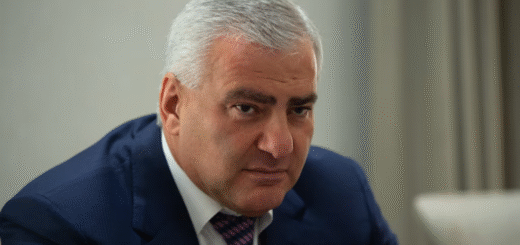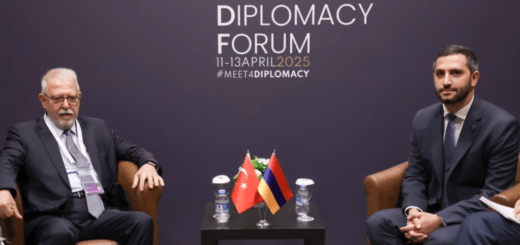US envoy Tom Barrack accused of plotting Turkey’s partition

When billionaire-turned-diplomat Tom Barrack arrived in Ankara in May as US President Donald Trump’s ambassador to Turkey, he delivered an unexpectedly emotional speech.
“I think it’s a really monumental day for me, feeling the echo of this land from which my ancestors came,” he said.
“But I come with a really simple message from President Trump: his desire to raise the level of the alliance between Turkey and the United States to where it rightfully belongs.”
Two months later, Turkish officials are convinced that Barrack is among the most influential US ambassadors ever to serve in the country.
His ever-expanding portfolio, now encompassing both Syria and Lebanon, aligns with Ankara’s priorities, such as preserving a unified Syrian state under President Ahmed al-Sharaa with a single military.
Both Ankara and Barrack seek a stable region. Turkish officials hope that Barrack, who has a direct line to Trump, could help resolve longstanding issues, from the stalled purchase of F-35 fighter jets to the removal of sanctions on Turkey over its purchase of Russia’s S-400 missile system.
Barrack also made several remarks expressing his admiration of Turkey and its history.
Newspapers and political influencers have launched a campaign against the US envoy, accusing him of attempting to break up the country.
Despite Turkey’s longstanding history of anti-American sentiment, rooted in the US partnership with Syrian Kurdish groups and its harboring of the late Fethullah Gulen and his supporters, for the first time in years, an American ambassador is under attack not from government media, but from the opposition, over his conduct.
Misquoted
The controversy began with Barrack’s interview with Turkey’s public Anadolu news agency in late June, where he referenced the Ottoman Empire’s millet system, which oversaw religious communities from Christians to Jews.
Barrack explained that the millet system, which granted religious communities limited autonomy over their own affairs, ensured the survival of diverse groups in the region.
He added that a new dialogue between states and cultures was needed today.
“To me, Izmir is the example of how you blend all these communities – Jews, Muslims and Christians living side by side,” he said.
“I see this as the model of what needs to happen in the Middle East and the world. And I think Turkey can be the center point of it all.”
Within days, a flurry of social media posts and newspaper articles misquoted him, claiming that he had advocated for the millet system as the ideal order for modern Turkey, a statement he never made.
For many Turkish citizens, the millet system evokes painful memories of a weakened Ottoman Empire in the 19th century, teetering on the brink of partition along ethnic and nationalist lines.
“US Ambassador Tom Barrack showered praise on the Ottoman’s religion-based millet system!” wrote Arslan Bulut, a journalist for the nationalist opposition newspaper Yeni Cag, earlier this month.
“For this, Turkey must be stripped of its nation-state status!”
Husnu Bozkurt, a former parliamentarian from the Republican People’s Party (CHP), took it further:
“For years, we’ve warned that imperialist America seeks to divide the secular Republic of Turkey by transforming it into a religiously-governed state under its control, destroying the unitary nation-state structure, turning it into a federation, and eliminating linguistic unity by splitting the nation along sectarian and ethnic lines – the ultimate goal of the Greater Middle East Project (BOP).”
Barrack is viewed as unconventional among western ambassadors in Turkey, spending much of his time in the region and in Istanbul.
His candid interviews with various publications are often taken out of context, as he speaks without reservation.
PKK peace talks
As Barrack grapples with these reactions, Turkey is engaged in peace talks with the Kurdistan Workers’ Party (PKK) and its jailed leader Abdullah Ocalan, after more than 40 years of conflict.
Earlier this year, the PKK announced an end to its armed struggle and, in a symbolic ceremony this month, burned its weapons, a development that has left many Turks uneasy about the country’s future.
Retired Colonel Unal Atabay argued that Barrack’s alleged suggestion to revive the Ottoman religion-based millet system would undermine Turkey’s status as a nation-state.
“Isn’t it interesting… This is exactly what Ocalan refers to as Middle Eastern unity,” he said.
“It’s about ensuring the formation of a separatist Kurdish region while transforming Turkey into an Ottoman-like state.”
Barrack’s recent interview with the Associated Press about Israeli strikes on Damascus and Sweida in Syria over the weekend did little to help his case.
He suggested that Israel would rather see Syria fragmented and divided than governed by a strong central state.
“Strong nation-states are a threat – especially Arab states are viewed as a threat to Israel,” he said. But in Syria, he noted, “I think all the minority communities are smart enough to say, ‘We’re better off together, centralized.’”
Turkish media and commentators interpreted Barrack’s criticism of Israel as indirect approval of US efforts to partition strong nation-states in the region.
At the same time, Devlet Bahceli, a Turkish nationalist leader within President Recep Tayyip Erdogan’s ruling coalition, proposed that Turkey could, in the future, appoint two vice presidents, one Kurdish and the other Alevi, a minority religious group that has sometimes reported persecution.
Mehmet Ali Guler, a columnist for the opposition Cumhuriyet daily, argued that Bahceli’s proposal and Barrack’s comments on the Ottoman millet system all serve the same purpose: “The Lebanonization of Turkey”.
Bahceli in a statement strongly rebuked the allegations, calling them “distortions”.
The US Embassy in Ankara has remained silent in the face of these accusations.






